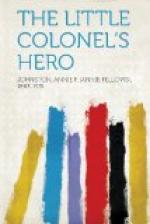Hero’s turn came next. Released from his long, tiresome confinement in the baggage-car, he came bounding into their midst, almost upsetting the Little Colonel in his joy at having his freedom again. He put out his great paw to each of the little girls in turn as Lloyd bade him shake hands with his new neighbours, but he growled suspiciously when Walker came up and laid black fingers upon him. He had never seen a coloured man before.
It was Betty’s first meeting with the Walton girls. She had looked forward to it eagerly, first because they were the daughters of a man whom her little hero-loving heart honoured as one of the greatest generals of the army, who had given his life to his country, and died bravely in its service, and secondly because Lloyd’s letters the winter before had been full of their sayings and doings. Mrs. Sherman, too, had told her many things of their life in Manila, and she felt that children who had such unusual experiences could not fail to be interesting. There was a third reason, however, that she scanned each face so closely. She had given them parts in the new play, and she was wondering how well they would fit those parts.
They in turn cast many inquiring glances at Betty, for they had heard all about this little song-bird that had been taken away from the Cuckoo’s Nest. They had read her poem on “Night,” which was published in a real paper, and they could not help looking upon her with a deep feeling of respect, tinged a little with awe, that a twelve-year-old girl could write verses good enough to be published. They had heard Keith’s enthusiastic praises of her.
“Betty’s a brick!” he had said, telling of several incidents of the house party, especially the picnic at the old mill, when she had gone so far to keep her “sacred promise.” “She’s the very nicest girl I know,” he had added, emphatically, and that was high praise, coming from the particular Keith, who judged all girls by the standard of his mother.
As soon as the trunks were attended to, Mr. Sherman led the way to the carriage, waiting on the other side of the platform. Hero was given a place beside Walker, and although he sprang up obediently when he was bidden, he eyed his companion suspiciously all the way. The pony-cart trundled along beside the carriage, the girls calling back and forth to each other, above the rattle of the wheels.
“Oh, isn’t Hero the loveliest dog that ever was! But you ought to see our puppy—the cutest thing—nothing but a bunch of soft, woozy curls.” ... “We’re in the new house now, you must come over to-morrow.” ... “Mother is going to take us all camping soon. You are invited, too.” This from the pony-cart in high-pitched voices in different keys.
“Oh, I’ve had a perfectly lovely time, and I’ve brought you all something in my trunk. And say, girls, Betty is writing a play for the Red Cross entertainment. There’s a witch in it, Kitty, and lots of pretty costumes, Allison. And, oh, deah, I’m so glad to get home I don’t know what to do first!” This from the carriage.




